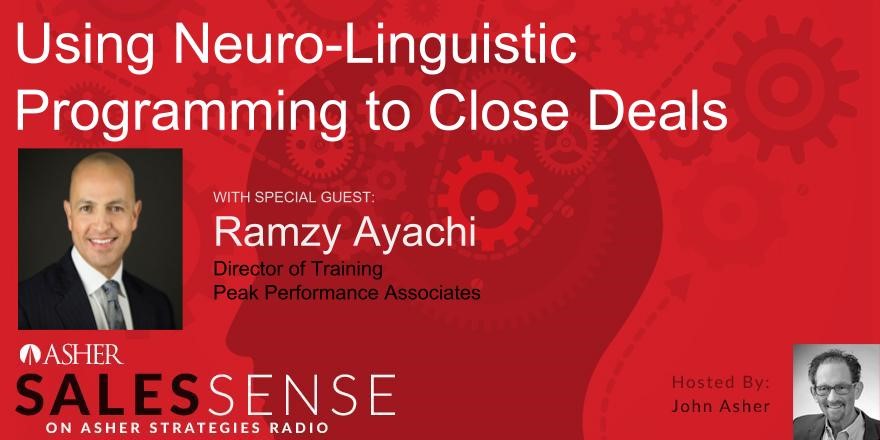Sales Tactics: 3 Effective NLP Techniques to Boost Your Sales Performance

Emotional intelligence for sales success requires learning how buyers react to certain activators and why. When you have this knowledge, you will be more in tune with prospects and close more deals faster.
One shortcut for applying EQ is to deliberately work to increase empathy for your buyers. This means to really consider other peoples’ points of view, because we all have a tendency to fixate on our own. While this is a great start, it will only take you so far when you consider how complex human beings and personal relationships are.
The field of neuro-linguistic programming provides deeper insights into how buyers respond to our words and actions. When combined with a sales competency assessment that illuminates our own personality strengths and weaknesses, we can better understand emotions and apply specific techniques to control them.
For years, we’ve worked to identify the most powerful NLP components relevant to salespeople and relate them with the data gained through sales competency assessments. What we’ve discovered is this: sales professionals can proactively change their behavior and how they interact with customers and colleagues in order to produce better outcomes., even with previously difficult personas. The first key is self-awareness, and the second is the practical application of NLP.
The sales competency assessment we use, and its benefits, have been covered extensively in our blog library. In this post, we are going to focus on some actual techniques to introduce you to the world of NLP and salesmanship.
Modal verbs/operators
Modal verbs indicate that something is possible, likely, obligated, or permitted. These include terms such as: could, may, might, must, will, shall, should, would. The terms a person chooses reflects, and can affect, his or her internal state.
Different personality types tend to express themselves using the same kind of verbs. For example, dominant types use “must” and “will” in their speech while thoughtful or supporter types prefer “could” and “might.” The first set creates a sensation of pressure and obligation, whereas the latter terms suggest a lighter, non-committal optimism.
In practical terms, if a sales competency assessment shows you have an impatient, driven personality, you will likely use stronger verbs – making your empathetic-type buyers uncomfortable If you do not adjust to their persona.
The reverse is true – if you tend towards passivity, adjust your verbs to be stronger when calling upon an A-type customer and you will instantly have better communication with them.
Can you see how something as simple as tweaking your verbs could positively affect your selling efforts?
Paint vivid pictures
One of the primary activators that wakes up the old brain is images. This includes photographs, videos, icons, logos, art and more. It also includes the imagery in the mind, as in mental image pictures.
Imagine you are floating on a rubber raft in a luxurious resort pool, looking at bright fluffy clouds on a nice summer’s day. A deliciously warm breeze flows over your body and all you hear is the sound of light splashing and a few hushed but happy voices some distance away. Your right foot lazily dips into the comfortably cool water, and you inhale a pleasant combination of lightly fragranced sunscreen and hints of a fired-up barbecue grill.
Most people who read the above will instantly, as soon as they read the word “imagine,” begin to experience all of the imagery I described. They will feel the breeze, the wetness of the water, the heat of the sun, and experience the aromas. Some will even salivate at the prospect of a barbecue! The point is, it woke up your old brain.
And this illustrates the power of painting vivid word pictures when selling to prospective buyers. When you wake up their old brain, they see themselves in the pictures you paint and begin to imagine the benefits they could experience if they go forward with the deal.
This phenomenon is why stories are so mesmerizing. Elite salespeople and corporate speakers fill their presentations with case studies and anecdotes. They compel audience members to listen and immerse themselves in the scenarios described, and could even shut off some of the criticisms they have.
Pacing and Leading
A sales competency assessment will show whether a salesperson is naturally persuasive. In addition to this natural talent, however, he or she must be trained in effective techniques to persuade. And some of the classic selling techniques have their basis in or can be explained by NLP.
As an example, what is sometimes referred to as “Minor Agreements” or the “Staircase to Yes” is called “Pacing and Leading” in NLP. The way this technique works is by a salesperson conditioning a buyer to say yes to the overall deal by getting them to agree to minor points along the way to the close.
For example, “this is a nice color, isn’t it?” or “it would be nice to solve your training issues, wouldn’t it?” or even “that looks good, right?” This is often reinforced by the salesperson nodding, which subconsciously triggers the buyer to mirror the agreement.
What this does is create conditions which make it easier to continue to say yes when the salesperson finally asks the buyer to pull the trigger. It literally makes a buyer uncomfortable to try to switch gears to a no.
Stay tuned, we have many more strategies to share in future posts.
For more information available right now on this fascinating subject, listen to our podcast Using Neuro-Linguistic Programming to Close Deals with Peak Performance Associates’ Ramzy Ayachi




